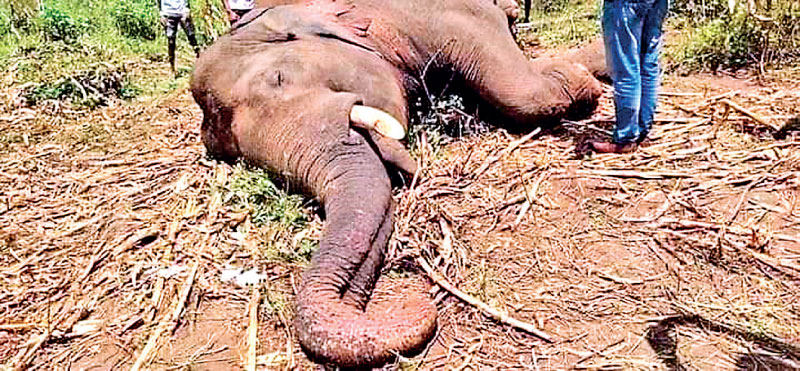Wednesday Feb 25, 2026
Wednesday Feb 25, 2026
Thursday, 10 February 2022 01:05 - - {{hitsCtrl.values.hits}}

By Sarasi Wijeratne
The Kekirawa Magistrate gave the police time to obtain an expert report from the University of Moratuwa during Monday’s court hearing of the death of Rewatha the tusker.
Rewatha, a popular elephant who many visitors to the Kalawewa area tried to catch a glimpse of, died in March last year after he was electrocuted by a fence which surrounded a corn cultivation in Aliyawatuanuwewa in Kekirawa. The way the fence had been powered was illegal.
The University report is expected to analyse the features of the electric fencing which killed the tusker. The cables that were used have been produced as an exhibit in the case.
During the hearing, which was the fourth since the start of legal proceedings in March last year, the magistrate told the police to designate an officer to deposit Rewatha’s tusks in the National Museum in Colombo. There will be provision to retrieve them in future for use as exhibits in the case if required.
The police investigations into the case are expected to be completed by the date of the next hearing on 29 August when the court will take up the matter again.
The Provisions of the Fauna and Flora Protection Ordinance make the killing of elephants a non-bailable offence which carries a fine of between Rs. 100,000 and Rs. 500,000 and a jail term of between two and five years. A conviction can result in both a fine and a term of imprisonment.
President’s Counsel Anura Meddegoda who is looking after the legal interests of the dead tusker together with his team of lawyers told court at the beginning of the proceedings last year that the electrocution of an elephant is a non-bailable offence.
The accused is currently on bail.
The death of Rewatha, who had endeared himself to the villagers of Kahalla Pallekele which was his home range, was a likened to the setting of the sun in Kalawewa.
The gentle tusker who was around 45-50 years at the time of his death had not harmed anyone, nor had he damaged crops. His death was followed by a public outcry and an outpouring of grief.
Rewatha is one of more than 57 tuskers who have been killed in Sri Lanka in the past years.
The number of elephants in the country that are dying from electrocution has also been on the rise. In 2019, around 43 elephants died after they were electrocuted.
In 2020, the number of deaths dropped to 14 because of COVID mobility restrictions. But by the first three months of 2021, around 19 elephants had already died from electrocution.
Counsel Meddegoda is instructed by intervening petitioners from the Centre for Environmental Justice, Justice for Animals and the Wildlife and Nature Protection Society.